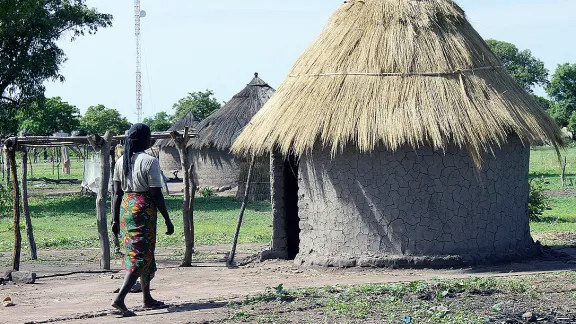
Treatment and care enabled Améline to move freely and take care of her children again. Photo: LWF/ C. Kästner
“I feel more respected now”
GORE, Chad / GENEVA, 23 June 2015 (LWI) - The log is still lying in the yard of her home in Maro village, Chad. It's a big white chunk of wood, heavy to lift and polished from a person touching it and sitting on it all day. The log was used to chain Améline (not her real name) for almost two years. The 35-year-old woman has severe mental health problems due to a brain infection after she contracted meningitis two years ago. Only when a case worker of The Lutheran World Federation (LWF) found her, did things take a turn for the better.
“There are nine cases in this village alone,” Francoise Milamem, LWF case worker, says. She found Améline and four other people with severe mental problems, all of them living under terrible inhuman conditions. They have epilepsy, psychoses, multiple personality disorders or other health problems. Often, their condition is worsened by non-acceptance in their communities and the lack of mental health specialists.
Exhausted relatives, neglected patients
People in the community of Maro in southern Chad host more than 50,000 refugees from the Central African Republic. There are only a few resources to deal with mental and psychological problems. LWF case worker Milamem has documented the conditions in which she found mentally ill people: Naked, neglected, tied up and in poor health.
“I had a prescription for the hospital, but she refused to go,” Améline’s husband Adumi says. “So I went to a traditional doctor.” The tribal method of healing was above all costly: Adumi sold land and a cow to pay for his wife’s treatment. “We had to pay for a goat and traditionally sacrifice it, but it did not help,” he says. On top of everything else, the family has a large debt.
For the mentally ill and their relatives, the LWF first aid psychosocial support usually comes at a time when people are desperate. Sometimes the sick have already been abandoned by their families and spouses.
“She would become aggressive to me, beat her children and destroy things,” Francoise recalls Améline’s initial state. “In other moments, she was mentally absent, in her own world.”
As Améline's parents refused to take responsibility, her husband Adumi was soon left alone to deal with their six little children and an illness which he did not understand. When Améline set the house on fire and destroyed all the family’s belongings, including birth certificates and other papers, he decided to chain her to the log. “I thank God that LWF came in to help us,” he says.
Help beyond medical treatment
LWF does not provide medical services but its support is essential in identifying cases and convincing those affected to seek professional help. Usually, people are found through community house visits. Once a week, the LWF also provides counseling at a listening center in Maro. “We have about four cases each time,” LWF staff Milamem says. The stories differ between cases of mental illness but also domestic violence, abuse and female genital mutilation.
After she had convinced Améline to see a doctor and take the prescribed drugs, Milamem continued to monitor the family’s situation through regular visits and face to face sessions at the listening center. Often, the medical treatment is just part of a long process of improving the domestic situation.
For Améline’s family, the priority is now to pay their debts. The family has been registered for LWF livelihood support. Adumi will receive a small cash grant to open a business. “Améline can make little cakes and I will smoke fish, which we will take to the market to sell,” he says. He also cleared a field behind the house and plans to plant peanuts.
Still, Améline often has an absent look on her face. “I feel a little better,” she says quietly. Medication makes her tired, but she prepares food and takes care of the little children. “I will not abandon her, she is the mother of my children,” Adumi says. He still does not feel comfortable leaving her alone, but as Améline is receiving treatment, neighbors come in to help.
”I feel more respected now,” Adumi says. “People greet us when they see Améline in the village. I am really happy for all that support.”


